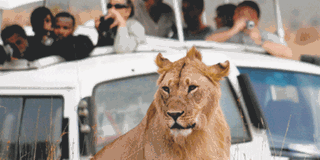Land tussle in the Mara threatens to cripple tourism

A tussle over land ownership in Maasai Mara is threatening to bring business to a standstill on the eve of a tourism boom. Photo/FILE
What you need to know:
- Battle between two rival Maasai groups over the ownership of 26, 000-hectare land is causing tension among visitors
A tussle over land ownership in Maasai Mara is threatening to bring business to a standstill on the eve of a tourism boom.
The battle that has spanned decades involves two rival Maasai groups— Oloololo Group Ranch, later named Oloololo Game Ranch Ltd and Oloirien Group Ranch Maasai, now called Ilkarekeshe Group Trust— which have laid claim to a 26, 100-hectare parcel.
Some of the prestigious lodges and tourist camps like Kichwa Tembo, Bateleur, Little Governors, Skyship Ballooning Company and Airstrip, are situated in the contested land.
Local leaders have warned that if the conflict is not resolved urgently, it might cripple business at Maasai Mara Game Reserve.
“This problem is a cause of tension for tourists who are visiting the Mara in this high season and this is negatively impacting on business,” Heritage Minister William ole Ntimama said during a meeting called by Lands Minister James Orengo (right) to resolve the problem, two weeks ago.
Members of the Siria Maasai (Ilkareshe community) at one point erected a tent outside Oloololo Gate to prevent tourists from accessing the busy ranch.
The conflict dates back to colonial period and has simmered through Kenyatta and Moi regimes.
While the land in dispute was taken away from the Maasai by the colonial government and later on handed back to them, a follow-up to the report of the visit by UN Special Rapporteur for indigenous peoples rights and freedoms says Oloololo obtained the land illegally.
“A group of Siria elites led by Councillor Kijape and former NSIS boss Samuel K. Tunai, through retired President Moi’s cronies, acquired the said stretch from the community and now hold a title deed in the name of Oloololo Game Ranch owned by them,” the report, prepared by Koissaba ole Rapaine of the Maa Civil Society Forum and dated February 2009, says.
Members of the Ilkarekeshe Trust allege that revenue collected from the game reserve benefits only a few individuals, who are not the rightful owners of the parcel.
“Over 500 Olorien families have been living in an internally displaced camp for eight years now yet this is our land,” Mr Jacob Magut, a member of the community, said.
Although the community claimed to own a title deed of the land, Oloololo termed the documents as forgeries.
During interviews at the disputed area, the community that depends on livestock keeping said that it had been denied access to water points along the Mara River and grazing areas that were handed to Siria clan by former President Jomo Kenyatta in 1975.
Documents obtained by the Nation show a history of unending disputes over the land.
The conflicts started in 1961 when colonial Narok DC Bwan Tempol created maps and boundaries without consulting local leaders.
He then asked everyone to leave the area but the Maasai refused arguing that it was their ancestral land.
Although the Kenyatta government maintained Mr Tempol’s orders, there was a U-turn in 1974 when Mzee Kenyatta ordered the minister for tourism to hand back the land to the Oloirien people, after listening to their grievances.
But a decade later, the ministry of Wildlife and Tourism gazetted the land, heralding a new tussle between the community and the government.
In yet another controversial move in 1993, a titled deed for the same piece of land was given to Oloololo Game Ranch, leaving the Oleirien people landless.
Years of debate in Parliament and meeting with land officials resulted in Lands PS declaring in 2001 that the land belonged to Ilkareshe Group Trust, to keep it in trustee for the Oloirien community.
But to date, all the land documents are yet to be given to the Oloirien community, with the Oloololo group still claiming ownership.
Mr Orengo, who met the two rival groups, said that he had referred the matter to be solved by the National Land Commission.




